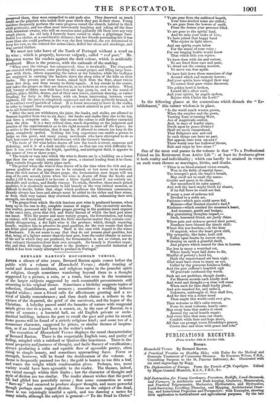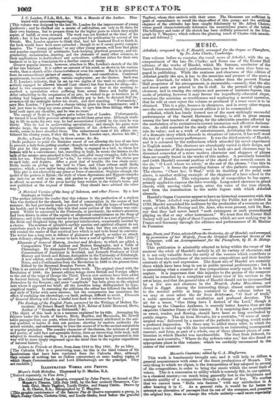PUBLICATIONS RECEIVED.
From October 10th to October 16th.
Boosts.
Household Verses. By Bernard Barton. A Practical Treatise on Healthy Skin; with Rules for the Medical and Domestic Treatment of Cutaneous Diseases. By Erasmus Wilson, F.RS., Consulting Surgeon to the St. Pancras Infirmary, &c. Illustrated with six steel engravings by Bagg. The Diplomatists of Europe. From the French of M. Capefigue. Edited by Major-General Monteith, K.L.S., F.KS., &c.
Self-Instruction for Young Gardeners, Foresters, Bailiffs, Land-Stewards, and Farmers, in Arithmetic and Book-keeping, Geometry, Mensuration, and Practical Trigonometry, Mechanics, Hydrostatics, and Hydraulics, Land-Surveying, Levelling, Planning, and Mapping,Architectural Draw- ing! and Isometrical Projection and Perspective: with Examples, showing their application to horticultural and agricultural purposes. By the late
J. C. Loudon, F.L.S.„ ILS., &c With a Memoir of the Author. Illus- trated with numercausengravings. [This volume was designedly the late Mr. Loudon for the improvement of young eners ; and he chalked out a. oourse of self-tuition, not only to fit them for air own business, but to prepare them for the higher posts to which they might aspire, of bailiff; or even steward. The work was not finished at the time of his death ; but it has been prepared and completed for publication by several of his friends. Mrs. Loudon appears to think that, had her husband lived to finish it, the book would have been more extended ; though to us it seems pretty compre-
hensive. The " young gardener," or any other young person; will here'find plain and popular expositions of arithmetic, book-keeping, practical geometry, and tri- gonometry, mensuration, drawing, and the elements of many other sciences, in their applications to horticulture and agriculture, sufficient either for their own business or to lay a foundation'for a further course of study;
Greater popular interest, however, attaches to Mrs. London's sketch of the life of her late husband. It is rather an account of his mind, as shown in his various works, than a sketch of his charecteristicsor even his career. But it is attractive from its extraordinary pictureef energy, industry, and constitution. Continual acquirement, incessant activity,, various employment, are the themes. Such was J. C. London's industry, that he sat up two nights of the week to study—when actively engaged he allowed himself (and others) but four hours for sleep-dic- tated to two amanuenses at the same time--rose at four in the morning to overlook a speculation when suffering from severe illness and bodily pain.
After submitting to the amputation of an arm, he wished too to business as if nothing had happened, and was with diffie.ulty got to bed: he dictated SW-In- struction till the midnight before his death, and died standing. " Fortunately," " says Mrs. London, r perceived a change taking place in his countenance; and I had just time to clasp my arms around him, to save him film falling, when hie head sank upon my shoulder, and, he was no more."
The energy of Scott or Napoleon pales before that of London. Unfortunately, he turned it to as little personal advantage asdid those great men. Although start- ing in life to make his own way, he had accumulated 15,0001: by the time he was thirty. This he lost in underwriting speculations; and though his gains were always large, the more legitimate speculation of his Arboretum, and similar works, seems to have absorbed them. The embarrassed state of his affairs em- bittered his closing years, if they did not, as Mrs. Loudonsays, shorten his life.] Stella; a Poem of the Day, in three cantos; &c. See. [Stella professes to point the feminine moral of not allowing the loss of one love to prevent a lady from getting another; though the writer phrases it in loftier style. The plot for this purpose is simple. Stella is engaged.to a lord, to whom her Winne will be a convenience; but, travelling in Italy, he meets the heiress to the hullc.of the estates once attached to his title,and, after many struggles, falls in love with her too. Finding himself In " a fix," he writes an account of the status quo tbatach lady, and departs. After a good deal of trouble, the. two rivals meet: Stella insists on giving up the lord to Clare, and Clare refuses until Stella marries; which, a new suitor being already in the field, is quickly brought about. This plot is not adorned by any grace or force of execution. Singular enough, the model of the poetess is Byron; the style of whose digressions and flippant remarks she imitates as well as she can, and pushes to a greater length. An apology is offered on account of the poem having been written in the writer's teens, and now published at the request of friends. They should have advised the other way.] A Metrical Version ofthe Song of Solomon, and other Poems. By a late Graduate at Oxford.
[The preface informs the reader that this volume is the production of a student who was destined for the church, but died of consumption in the course of last summer. He had previously made a journey to Spain, with the hopes of benefiting his health; and it was during this trip that some portion of the volume was com- posed. Whilst he sojourned in the Peninsula, or previously, the writer's attention had been drawn to some of the mystic or allegorical commentators on the Song of Solomon; and in his metrical version he has reconstructed it as a sort of pastoral,— the Bride and Shepherd being. the principal interlocutors, occasionally assisted by a chorus. The mixture of primitive earthly passion and spiritual allegory do not contribute much to the popular interest of the book; but they are curious, and will remind the reader of that mystical love which is said to be found in convents. The writer has a long note in defence of plainness of speech, or rather an attack upon delicacy; altegethershe seems to have been a sort of spiritual "Mr. Little."]
Elements of General History, Ancient and Modern; to which are added, a Comparative View of Ancient and Modern Geography, and a Table of Chronology. By Alexander Fraser Tytler, Lord Woodhouselee, late Lord Commissioner of Justiciary in Scotland, and formerly Professor of Civil History and Greek and Roman Antiquities in the University of Edinburgh. A new edition, with considerable additions to the Author's text, numerous Notes, and a Continuation from the Revolution in 1688 to the present time. Edited by the Reverend Brandon Turner, M.A.
This is an extension of Tytler's well-known work. The original closed with the Revolution of 1688; the present edition brings down British and Foreign affairs to the end of the reign of George the Third. Eleven new sections have been added to Ancient history, including an outline of Jewish history to the destruction of Jerusalem by the Romans; and more "amplitude" has been given to the original text where it appeared too brief; all the novelties being distinguished by typo- gra.phical marks. In executing the additions the editor has followed the method and style of Tytler with some success; but the compression has sometimes the effect of confusing the chronology,—a fault; perhaps, difficult to avoid. Elements of General History will.form a useful text-book or reference for facts.]
The Zoology of the English Poets, corrected by the Writings of Modern Na- turalists. By Robert Hasell Newell, B.D., Rector of Little Hormead, Herts, Author of " Remarks on Goldsmith," &c.
[The object of this book is in a measure explained by its title. Arranging his subjects under the heads of Bisects, Birds, Reptiles, and Mammalia, Mr. Newell takes passages from our poets, where they have erroneously attributed to the ani- mal qualities or habits it does not possess; showing by modern authority the actual mistake, and endeavouring to trace the 'source of it to the ancient naturalists or popular prejudice. The country characterof thethemee, the mixture of prose and poetry, of solid fact and-agreeable fiction, form an interesting little book, well adapted to desultory reading. It is probable, tooi that the facts presented in this way will be more deeply impressed upon the mind than in the regular expositions of natural history.] Letters to Friends at Home, fronuJune.1844 to May 1845. By an Idler. The Calcutta Idler is a persevering man; for this is the third volume of his lucubration& that have been reprinted from the Calcutta Star, although tine, consist, of nothing, but an Indian commentary on some leading topics, of *nth, Steam. Communication, and Lord Ellenborough are the principal. They are readable.]
ILLUSTRATED WORE& NED PRINTS.
Moore's Irish Melodies. Illustrated hya.Mticlise, R.A. [Noticed separately, in Fine Arts.]
The Celebrated Paa de. Quatro, composed hy Jules Perrot, as danced at Her Majeety's Theatre, 12111July 1845; by the tour eminent Dansenses, Car- lotta Grin, Marie Taglioni, Lucile Gratin, nd'Fanny Cerito. Drawn by A. E. Chalon, FLA,. ; lithographed be 'E Ithquire. [This graphic reminiscence of the famous Plmdt Quatro represents a group, in tAich Faimy.Cerito,. Carlotta.Grisi, and Lucile Gtahn, bend' before the, graceful
Taglioni, whom they encircle with their arms. The likenesses are sufficient in, point of resemblance to reeall.the stage-effect of this group; and the artificial elegance of the attitudes has been caught felicitously by Mr. Alfred Chalons whose pencil characteristically delineates the meretricious graces of the ballet. The brilliancy and taste of the sketch has been skilfully preserved in the litho- graph by T. Maguire; which reflects the glancing touch of Chalon with smooths noes and delicacy.]



























 Previous page
Previous page